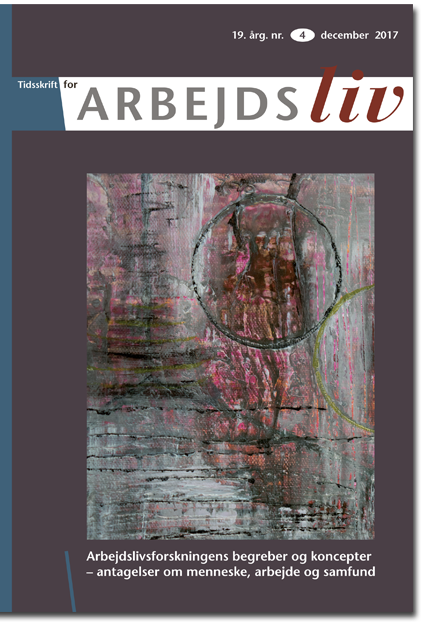How do Danish workplaces handle work-related sickness?
Experiences from employees with mental disorders, low back pain or skin disease
DOI:
https://doi.org/10.7146/tfa.v19i4.109054Abstract
Mental health and musculoskeletal disorders constitute the largest health and safety challenges at the Danish labour market. An increasing number of employ - ees are notified with these occupational diseases in the Danish Workers Compensation System. The primary objective of this study is to examine the nature of workplace disability management practices, when an employee is sick listed due to work-related disease. Secondary objectives are to analyze stakeholder roles and engagement at the workplace and to examine possible differences in relation to the type of disease. The experiences of employees with notified occupational mental disorders (N=436), low back pain (N=202) and skin diseases (N=132) are compared. The results indicate that employer efforts and preventive actions to accommodate the sick employees varied. Some employers applied accommodations at the individual level, but there appeared to be a lack of changes at workplace level, even though the disease was caused by the working conditions. Employees with work-related mental disorders perceived top management, line managers and the occupational health and safety representative more negative, and the union more positively than employees with low back pain or skin diseases. However, in most cases the occupational health and safety representative and the union representative were not directly involved in the process. Additionally, it seems that the work environmental authority seldom inspected the workplaces, even though an occupational disease was notified. 35,1 % of the employees experienced that they resumed work too early, and 2-4 years after the disease was reported, 39,2 % of employees with mental disorders and 47,5 % with low back pain were unem - ployed. The findings point to challenges in workplace disability management practices and regulation at the Danish labor market, stressing the need for renewed policy attention that brings all stakeholders to the table.
Downloads
Published
How to Cite
Issue
Section
License
Forfattere, der publicerer deres værker via dette tidsskrift, accepterer følgende vilkår:
- Forfattere bevarer deres ophavsret og giver tidsskriftet ret til første publicering, samtidigt med at værket ét år efter publiceringen er omfattet af en Creative Commons Attribution-licens, der giver andre ret til at dele værket med en anerkendelse af værkets forfatter og første publicering i nærværende tidsskrift.
- Forfattere kan indgå flere separate kontraktlige aftaler om ikke-eksklusiv distribution af tidsskriftets publicerede version af værket (f.eks. sende det til et institutionslager eller udgive det i en bog), med en anerkendelse af værkets første publicering i nærværende tidsskrift.
- Forfattere har ret til og opfordres til at publicere deres værker online (f.eks. i institutionslagre eller på deres websted) forud for og under manuskriptprocessen, da dette kan føre til produktive udvekslinger, samt tidligere og større citater fra publicerede værker (se The Effect of Open Access).





